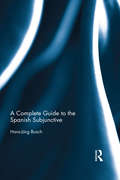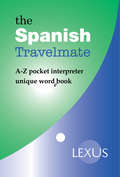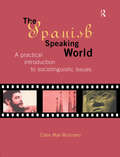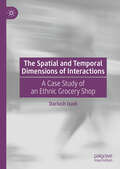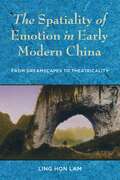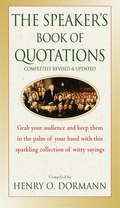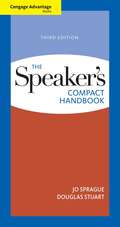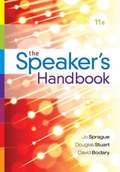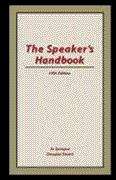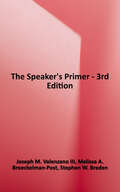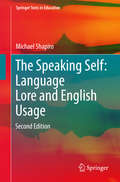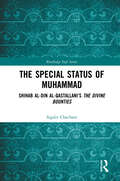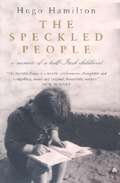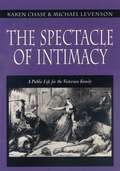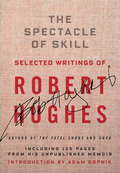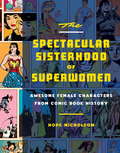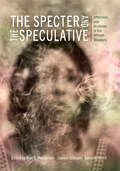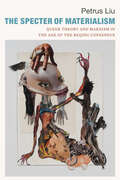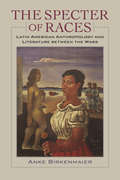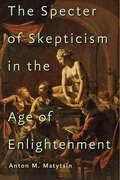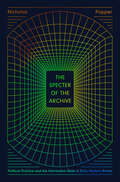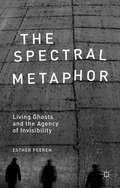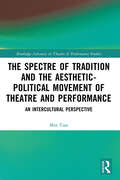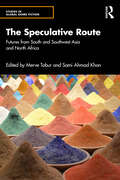- Table View
- List View
The Spanish Subjunctive: A Reference for Teachers
by Hans-Jörg BuschA Complete Guide to the Spanish Subjunctive is the most complete reference guide to the use of the subjunctive in Spanish. Along with an exhaustive review of published literature on the subjunctive, the book also includes a thorough discussion of the uses and meanings of the subjunctive as well as examples throughout drawn from linguistic corpora such as the CREA database. The book presents a comprehensive theory of the subjunctive and provides practical rules for understanding, teaching and acquiring the Spanish subjunctive. This book includes: "Your Turn" sections that invite readers to reflect on the content discussed and on their own experiences in teaching the subjunctive A "Synopsis" section that summarizes the content of the work and offers practical suggestions for teaching the subjunctive Two indexes providing a summary of verb conjugation in the subjunctive and an alphabetical list of expressions used with the subjunctive.
The Spanish Travelmate
by Lexus Alicia de Benito Harland Mike HarlandThe Spanish Travelmate phrasebook and dictionary gives you a detailed yet easy-to-use A to Z list of English words and phrases with Spanish translations for quick-find reference. There are more than 3500 words and phrases, and the Spanish translations come together with an easy-to-read pronunciation guide. Tap a hyperlink (there are hundreds of them) to go to special sections: travel tips about being in Spain; basic language notes; typical Spanish replies to your Spanish questions; conversion tables. These are features which make the Travelmate the must-have ebook Spanish phrasebook download for the traveller who wants to really communicate. The Spanish Travelmate phrasebook and dictionary also gives you a detailed Spanish menu reader of over 500 items and a dictionary section with translations of over 300 common Spanish signs and notices. This is the little book that's a big help. And a joined-up language experience.
The Spanish-Speaking World: A Practical Introduction to Sociolinguistic Issues (Routledge Language in Society)
by Clare Mar-MolineroThis accessible textbook offers students the opportunity to explore for themselves a wide range of sociolinguistic issues relating to the Spanish language and its role in societies around the world. It is written for undergraduate students who have a sound practical knowledge of Spanish but who have little or no knowledge of linguistics or sociolinguistics. It combines text with practical exercises and discussion questions to stimulate readers to think for themselves and to tackle specific problems.In Part One Clare Mar-Molinero discusses the position of Spanish as a world language, giving an historical account of its development and dominance. Part Two examines social and regional variation in Spanish, and investigates dialects, language attitudes, and style and register, particulaly in the media. The author also questions the relationship between gender and language. Part Three focuses on current issues, particularly those arising from language policies and legislation, especially in the education system, in Spain, Latin America and the USA.
The Spatial and Temporal Dimensions of Interactions: A Case Study of an Ethnic Grocery Shop
by Dariush Izadi“This book provides a significant contribution to the discursive analysis of service encounters. It demonstrates, in a very elegant way and based on a solid empirical investigation, how mediated discourse analysis may be enacted to describe and understand the social and cultural practices associated with space, time, ethnicity and identity construction. A must-read for researchers and practitioners interested in language use in professional contexts.”-- Laurent Filliettaz, University of Geneva, Switzerland“This book contains one of the most thorough and productive applications of the theoretical and analytical apparatus of mediated discourse analysis I have come across, demonstrating how the moment-by-moment ways that people appropriate discourse to perform mundane daily activities such as shopping contribute to the broader maintenance of social identities and communities. The analysis is meticulously undertaken and communicated in clear, elegant prose. This book will be of interest to anyone working in the field of discourse studies."-- Rodney Jones, University of Reading, UKThis book investigates the social practices of service encounters in the context of a typical Persian shop in Sydney. Although by nature goal-oriented speech events, the book posits that service encounters are not simply limited to achieving business transactions, but that they incorporate a range of social and discursive practices. Analysing ethnographic data using the frameworks of Mediated and Multimodal Discourse Analysis, the author explores how people use everyday activities to enact social and cultural identities, construct linguistic authenticity, and maintain strong economic ties to the community. It will be of interest to scholars and students of the sociolinguistics of ethnic/ minority sites and urban spaces.Dariush Izadi holds a PhD in Sociolinguistics and teaches Language and Linguistics Research Methods, Sociolinguistics, Discourse Analysis and TESOL Units at Western Sydney University, Australia. In his work, he applies mediated discourse and nexus analysis to investigate practices and methods through which participants accomplish their actions in social settings.
The Spatiality of Emotion in Early Modern China: From Dreamscapes to Theatricality
by Ling Hon LamEmotion takes place. Rather than an interior state of mind in response to the outside world, emotion per se is spatial, at turns embedding us from without, transporting us somewhere else, or putting us ahead of ourselves. In this book, Ling Hon Lam gives a deeply original account of the history of emotions in Chinese literature and culture centered on the idea of emotion as space, which the Chinese call “emotion-realm” (qingjing).Lam traces how the emotion-realm underwent significant transformations from the dreamscape to theatricality in sixteenth- to eighteenth-century China. Whereas medieval dreamscapes delivered the subject into one illusory mood after another, early modern theatricality turned the dreamer into a spectator who is no longer falling through endless oneiric layers but pausing in front of the dream. Through the lens of this genealogy of emotion-realms, Lam remaps the Chinese histories of morals, theater, and knowledge production, which converge at the emergence of sympathy, redefined as the dissonance among the dimensions of the emotion-realm pertaining to theatricality.The book challenges the conventional reading of Chinese literature as premised on interior subjectivity, examines historical changes in the spatial logic of performance through media and theater archaeologies, and ultimately uncovers the different trajectories that brought China and the West to the convergence point of theatricality marked by self-deception and mutual misreading. A major rethinking of key terms in Chinese culture from a comparative perspective, The Spatiality of Emotion in Early Modern China develops a new critical vocabulary to conceptualize history and existence.
The Speaker's Book of Quotations, Completely Revised and Updated
by Henry O. DormannFROM THE WORLDS OF BUSINESS, POLITICS, HISTORY, LITERATURE, ENTERTAINMENT, AND MORE . . ."Think how much happier women would be if, instead of endlessly fretting about what the males in their lives are thinking, they could relax, secure in the knowledge that the correct answer is: very little."--DAVE BARRY"I'd tell you what I really thought about the national media, but as my good friend Dana Carvey would say, 'Wouldn't be prudent. Not gonna do it.' "--GEORGE BUSH"We must believe in luck. For how else can we explain the success of those we don't like?"--JEAN COCTEAU"Don't find fault. Find a remedy."--HENRY FORD"Peace is more precious than a piece of land."--ANWAR SADAT"People who read tabloids deserve to be lied to."--JERRY SEINFELD"Patriotism is not a short and frenzied outburst of emotion but the tranquil and steady dedication of lifetime."--ADLAI STEVENSON
The Speaker's Compact Handbook (3rd Edition)
by Jo Sprague Douglas StuartThe Speaker's Compact Handbook provides a concise and portable resource for speakers. It equips you with the essential information, tips, and tools you need to be an effective public speaker.
The Speaker's Handbook
by Jo Sprague Douglas Stuart David BodaryAs a flexible compendium of principles and examples that cover the entire process of preparing and delivering a speech, the eleventh edition of The Speaker's Handbook is both a reference guide for individual speakers and a textbook for use in public speaking courses. The Speaker's Handbook attempts to distill the most meaningful advice and provide the most useful examples. This edition includes annotated sample speeches by both student speakers and public figures.
The Speaker's Handbook (5th Edition)
by Jo Sprague Douglas StuartThis handbook will help students and professionals improve their public speaking skills. The handbook provides 30 stand-alone chapters on principles and provides examples and exercises on issues commonly confronted in preparing and delivering a speech. Sprague is affiliated with San Jose State University. Annotation ©2004 Book News, Inc., Portland, OR (booknews.com)
The Speaker's Primer
by Joseph M. Valenzano III Stephen W. Braden Melissa A. Broeckelman-PostThis book addresses the nuts and bolts of crafting and delivering different types of presentations, but unlike other public speaking handbooks, it builds on those principles and offers guidance on speaking in particular professional arenas. Throughout the book, the authors provide sidebars about the importance and application of public speaking principles specific to business, healthcare, education, politics, and the STEM fields of science, technology, engineering, and mathematics.
The Speaking Self: Language Lore and English Usage
by Michael ShapiroThis book aims to explain social variation in language, otherwise the meaning and motivation of language change in its social aspect. It is the expanded and improved 2nd edition of the author's self-published volume with the same title, based on revised and adapted posts on the author's Languagelore blog. Each vignette calls attention to points of grammar and style in contemporary American English, especially cases where language is changing due to innovative usage. In every case where an analysis contains technical or recondite vocabulary, a Glossary precedes the body of the essay, and readers can also consult the Master Glossary which contains all items glossed in the text. The unique form of the book's presentation is aimed at readers who are alert to the peculiarities of present-day American English as they pertain to pronunciation, grammar, and style, without "dumbing down" or compromising the language in which the explanations are couched. Praise for the First Edition "Michael Shapiro is one of the great thinkers in the realm of linguistics and language use, and his integrated understanding of language and speech in its semantic and pragmatic structure, grammatical and historical grounding, and colloquial to literary stylistic variants is perhaps unmatched today. This book is a treasure to be shared. " Robert S. Hatten, The University of Texas at Austin "Jewel of a book. . . . a gift to us all from Michael Shapiro. Like a Medieval Chapbook it can be a kind of companion whose vignettes on language use can be randomly and profitably consulted at any moment. Some may consider these vignettes opinionated. That would be to ignore how deeply anchored each vignette is in Shapiro's long and rare polyglot experience with language. It could well serve as a night table book, taken up each night to read and reflect upon --to ponder--both in the twilight mind and in the deeper reaches of associative somnolence. There is nothing else like it that I know of. " James W. Fernandez, The University of Chicago
The Special Status of Muhammad: Shihab al-Din al-Qastallani’s The Divine Bounties (Routledge Sufi Series)
by Sigalit ChachamThis book examines the special status of the Prophet Muḥammad, as described by the Cairene Sufi mystic Shihāb al-Dīn al-Qasṭallānī (d. 1517). It examines spiritual, material, and theological aspects of love for the Prophet as expressed in his al-Mawāhib al-laduniyya bil-minaḥ al-muḥammadiyya (“The Divine Bounties [Granted] Through the Gifts of Muḥammad”).Discussing an unknown layer in the religious literature written in the late Mamluk period, the author explores the vast intellectual legacy of a scholar hitherto ignored. Using intertextuality, the book delves into his complex insights and relationships with contemporaries and scholars in the post-classical period, as well as locating him within the debates and developments of post-classical Islamic theory and theology. This study joins previous ones arguing that literary activity within the Mamluk sultanate was vibrant and dynamic.Offering valuable insights, this work will be of interest to researchers and scholars of Middle East History, Mysticism, Sufi Studies, Religion, Islam and Theology.
The Speckled People
by Hugo Hamilton"The childhood world of Hugo Hamilton, born and brought up in Dublin, is a confused place. His father, a sometimes brutal Irish nationalist, demands his children speak Irish, while his mother, a softly spoken German emigrant who has been marked by the Nazi past, talks to them in German. He himself wants to speak English. English is, after all, what the other children in Dublin speak. English is what they use when they hunt him down in the streets and dub him Eichmann, as they bring him to trial and sentence him to death at a mock seaside court. Out of this fear and guilt and often comical cultural entanglements, he tries to understand the differences between Irish history and German history and turn the twisted logic of what he is told into truth. It is a journey that ends in liberation, but not before he uncovers the long-buried secrets that lie at the bottom of his parents' wardrobe."--BOOK JACKET.Title Summary field provided by Blackwell North America, Inc. All Rights Reserved
The Spectacle of Intimacy: A Public Life for the Victorian Family (Literature in History)
by Karen Chase Michael LevensonLove of home life, the intimate moments a family peacefully enjoyed in seclusion, had long been considered a hallmark of English character even before the Victorian era. But the Victorians attached unprecedented importance to domesticity, romanticizing the family in every medium from novels to government reports, to the point where actual families felt anxious and the public developed a fierce appetite for scandal. Here Karen Chase and Michael Levenson explore how intimacy became a spectacle and how this paradox energized Victorian culture between 1835 and 1865. They tell a story of a society continually perfecting the forms of private pleasure and yet forever finding its secrets exposed to view. The friction between the two conditions sparks insightful discussions of authority and sentiment, empire and middle-class politics. The book recovers neglected episodes of this mid-century drama: the adultery trial of Caroline Norton and the Prime Minister, Lord Melbourne; the Bedchamber Crisis of the young Queen Victoria; the Bloomer craze of the 1850s; and Robert Kerr's influential treatise, celebrating the ideal of the English Gentleman's House. The literary representation of household life--in Dickens, Tennyson, Ellis, and Oliphant, among others--is placed in relation to such public spectacles as the Deceased Wife's Sister Bill of 1848, the controversy over divorce in the years 1854-1857, and the triumphant return of Florence Nightingale from the Crimea. These colorful incidents create a telling new portrait of Victorian family life, one that demands a fundamental rethinking of the relation between public and private spheres.
The Spectacle of Skill
by Adam Gopnik Robert Hughes"I am completely an elitist, in the cultural but emphatically not the social sense. I prefer the good to the bad, the articulate to the mumbling, the aesthetically developed to the merely primitive, and full to partial consciousness. I love the spectacle of skill, whether it's an expert gardener at work, or a good carpenter chopping dovetails . . . I don't think stupid or ill-read people are as good to be with as wise and fully literate ones. I would rather watch a great tennis player than a mediocre one . . . Consequently, most of the human race doesn't matter much to me, outside the normal and necessary frame of courtesy and the obligation to respect human rights. I see no reason to squirm around apologizing for this. I am, after all, a cultural critic, and my main job is to distinguish the good from the second-rate." Robert Hughes wrote with brutal honesty about art, architecture, culture, religion, and himself. He translated his passions--of which there were many, both positive and negative--brilliantly, convincingly, and with vitality and immediacy, always holding himself to the same rigorous standards of skill, authenticity, and significance that he did his subjects. There never was, and never will be again, a voice like this. In this volume, that voice rings clear through a gathering of some of his most unforgettable writings, culled from nine of his most widely read and important books. This selection shows his enormous range and gives us a uniquely cohesive view of both the critic and the man. Most revealing, and most thrilling for Hughes's legions of fans, are the never-before-published pages from his unfinished second volume of memoirs. These last writings show Robert Hughes at the height of his powers and can be read only with pleasure and a tinge of sadness that his extraordinary voice is no longer here to educate us as well as to clarify and define our world.From the Hardcover edition.
The Spectacle of Skill: New and Selected Writings of Robert Hughes
by Adam Gopnik Robert Hughes"I am completely an elitist, in the cultural but emphatically not the social sense. I prefer the good to the bad, the articulate to the mumbling, the aesthetically developed to the merely primitive, and full to partial consciousness. I love the spectacle of skill, whether it's an expert gardener at work, or a good carpenter chopping dovetails . . . I don't think stupid or ill-read people are as good to be with as wise and fully literate ones. I would rather watch a great tennis player than a mediocre one . . . Consequently, most of the human race doesn't matter much to me, outside the normal and necessary frame of courtesy and the obligation to respect human rights. I see no reason to squirm around apologizing for this. I am, after all, a cultural critic, and my main job is to distinguish the good from the second-rate." Robert Hughes wrote with brutal honesty about art, architecture, culture, religion, and himself. He translated his passions--of which there were many, both positive and negative--brilliantly, convincingly, and with vitality and immediacy, always holding himself to the same rigorous standards of skill, authenticity, and significance that he did his subjects. There never was, and never will be again, a voice like this. In this volume, that voice rings clear through a gathering of some of his most unforgettable writings, culled from nine of his most widely read and important books. This selection shows his enormous range and gives us a uniquely cohesive view of both the critic and the man. Most revealing, and most thrilling for Hughes's legions of fans, are the never-before-published pages from his unfinished second volume of memoirs. These last writings show Robert Hughes at the height of his powers and can be read only with pleasure and a tinge of sadness that his extraordinary voice is no longer here to educate us as well as to clarify and define our world.From the Hardcover edition.
The Spectacular Sisterhood of Superwomen: Awesome Female Characters from Comic Book History
by Hope NicholsonA woman's place is saving the universe. Think comic books can’t feature strong female protagonists? Think again! In The Spectacular Sisterhood of Superwomen you’ll meet the most fascinating exemplars of the powerful, compelling, entertaining, and heroic female characters who’ve populated comic books from the very beginning. This spectacular sisterhood includes costumed crimebusters like Miss Fury, super-spies like Tiffany Sinn, sci-fi pioneers like Gale Allen, and even kid troublemakers like Little Lulu. With vintage art, publication details, a decade-by-decade survey of industry trends and women’s roles in comics, and spotlights on iconic favorites like Wonder Woman and Ms. Marvel, The Spectacular Sisterhood of Superwomen proves that not only do strong female protagonists belong in comics, they’ve always been there.
The Specter and the Speculative: Afterlives and Archives in the African Diaspora
by Mae G. Henderson Jeanne Scheper Emily Ruth Rutter Danielle Fuentes Morgan Fernando Gabriel Pagnoni Berns Gene Melton Diana Arterian Christopher Giroux Stella Setka Meina Yates-Richard Luis Omar Ceniceros Shamika Ann Mitchell Andrew R. Belton Kim White Sheila Smith McKoy Pekka Kilpeläinen Emiliano Aguilar Juan Ignacio Juvé Kajsa K. Henry McKinley E. MeltonThe Specter and the Speculative: Afterlives and Archives in the African Diaspora engages in a critical conversation about how historical subjects and historical texts within the African Diaspora are re-fashioned, re-animated, and re-articulated, as well as parodied, nostalgized, and defamiliarized, to establish an “afterlife” for African Atlantic identities and narratives. These essays focus on transnational, transdisciplinary, and transhistorical sites of memory and haunting—textual, visual, and embodied performances—in order to examine how these “living” archives circulate and imagine anew the meanings of prior narratives liberated from their original context. Individual essays examine how historical and literary performances—in addition to film, drama, music, dance, and material culture—thus revitalized, transcend and speak across temporal and spatial boundaries not only to reinstate traditional meanings, but also to motivate fresh commentary and critique. Emergent and established scholars representing diverse disciplines and fields of interest specifically engage under explored themes related to afterlives, archives, and haunting.
The Specter of Materialism: Queer Theory and Marxism in the Age of the Beijing Consensus
by Petrus LiuIn recent years, queer theory appears to have made a materialist turn away from questions of representation and performativity to those of dispossession, precarity, and the differential distribution of life chances. Despite this shift, queer theory finds itself constantly reabsorbed into the liberal project of diversity management. This theoretical and political weakness, Petrus Liu argues, stems from an incomplete understanding of capitalism’s contemporary transformations, of which China has been at the center. In The Specter of Materialism Liu challenges key premises of classic queer theory and Marxism, turning to an analysis of the Beijing Consensus—global capitalism’s latest mutation—to develop a new theory of the political economy of sexuality. Liu explores how relations of gender and sexuality get reconfigured to meet the needs of capital in new regimes of accumulation and dispossession, demonstrating that evolving US-Asian economic relations shape the emergence of new queer identities and academic theories. In so doing, he offers a new history of collective struggles that provides a transnational framework for understanding the nexus between queerness and material life.
The Specter of Races: Latin American Anthropology and Literature between the Wars (New World Studies)
by Anke BirkenmaierArguing that race has been the specter that has haunted many of the discussions about Latin American regional and national cultures today, Anke Birkenmaier shows how theories of race and culture in Latin America evolved dramatically in the period between the two world wars. In response to the rise of scientific racism in Europe and the American hemisphere in the early twentieth century, anthropologists joined numerous writers and artists in founding institutions, journals, and museums that actively pushed for an antiracist science of culture, questioning pseudoscientific theories of race and moving toward more broadly conceived notions of ethnicity and culture.Birkenmaier surveys the work of key figures such as Cuban historian and anthropologist Fernando Ortiz, Haitian scholar and novelist Jacques Roumain, French anthropologist and museum director Paul Rivet, and Brazilian sociologist Gilberto Freyre, focusing on the transnational networks of scholars in France, Spain, and the United States to which they were connected. Reviewing their essays, scientific publications, dictionaries, novels, poetry, and visual arts, the author traces the cultural study of Latin America back to these interdisciplinary discussions about the meaning of race and culture in Latin America, discussions that continue to provoke us today.
The Specter of Skepticism in the Age of Enlightenment
by Anton M. MatytsinEnlightenment confidence in the power of human reason was earned by grappling with the challenge of philosophical skepticism.The ancient Greek philosophy of Pyrrhonian skepticism spread across a wide spectrum of disciplines in the 1600s, casting a shadow over the European learned world. The early modern skeptics expressed doubt concerning the existence of an objective reality independent of human perception. They also questioned long-standing philosophical assumptions and, at times, undermined the foundations of political, moral, and religious authorities. How did eighteenth-century scholars overcome this skeptical crisis of confidence to usher in the so-called Age of Reason?In The Specter of Skepticism in the Age of Enlightenment, Anton Matytsin describes how skeptical rhetoric forced philosophers to formulate the principles and assumptions that they found to be certain or, at the very least, highly probable. In attempting to answer the deep challenge of philosophical skepticism, these thinkers explicitly articulated the rules for attaining true and certain knowledge and defined the boundaries beyond which human understanding could not venture. Matytsin explains the dialectical outcome of the philosophical disputes between the skeptics and their various opponents in France, the Dutch Republic, Switzerland, and Prussia. He shows that these exchanges transformed skepticism by mitigating its arguments while broadening the learned world’s confidence in the capacities of reason by moderating its aspirations. Ultimately, the debates about the powers and limits of human understanding led to the making of a new conception of rationality that privileged practicable reason over speculative reason. Matytsin also complicates common narratives about the Enlightenment by demonstrating that most of the thinkers who defended reason from skeptical critiques were religiously devout. By attempting either to preserve or to reconstruct the foundations of their worldviews and systems of thought, they became important agents of intellectual change and formulated new criteria of doubt and certainty. This complex and engaging book offers a powerful new explanation of how Enlightenment thinkers came to understand the purposes and the boundaries of rational inquiry.
The Specter of the Archive: Political Practice and the Information State in Early Modern Britain
by Nicholas PopperAn exploration of the proliferation of paper in early modern Britain and its far-reaching effects on politics and society. We are used to thinking of ourselves as living in a time when more information is more available than ever before. In The Specter of the Archive, Nicholas Popper shows that earlier eras had to grapple with the same problem—how to deal with too much information at their fingertips. He reveals that early modern Britain was a society newly drowning in paper, a light and durable technology whose spread allowed statesmen to record drafts, memoranda, and other ephemera that might otherwise have been lost, and also made it possible for ordinary people to collect political texts. As original paperwork and copies alike flooded the government, information management became the core of politics. Focusing on two of the primary political archives of early modern England, the Tower of London Record Office and the State Paper Office, Popper traces the circulation of their materials through the government and the broader public sphere. In this early media-saturated society, we find the origins of many issues we face today: Who shapes the archive? Can we trust the pictures of the past and the present that it shows us? And, in a more politically urgent vein: Does a huge volume of widely available information (not all of it accurate) risk contributing to polarization and extremism?
The Spectral Metaphor
by Esther PeerenWhat does it mean to live as a ghost? Exploring spectrality as a metaphor in the contemporary British and American cultural imagination, Peeren proposes that certain subjects - migrants, servants, mediums and missing persons - are perceived as living ghosts and examines how this figuration can signify both dispossession and empowerment or agency.
The Spectre of Tradition and the Aesthetic-Political Movement of Theatre and Performance: An Intercultural Perspective (Routledge Advances in Theatre & Performance Studies)
by Min TianThis book interrogates anew the phenomenon of tradition in a dialogical debate with a host of Western thinkers and critical minds. In contrast to the predominantly Western approaches, which look at traditions (Western and non-Western) from a predominantly (Western) modernist perspective, this book interrogates, from an intercultural perspective, the transnational and transcultural consecration, translation, (re)invention, and displacement of traditions (theatrical and cultural) in the aesthetic-political movement of twentieth-century theatre and performance, as exemplified in the case studies of this book. It looks at the question of traditions and modernities at the centre of this aesthetic-political space, as modernities interculturally evoke and are haunted by traditions, and as traditions are interculturally refracted, reconstituted, refunctioned, and reinvented. It also looks at the applicability of its intercultural perspective on tradition to the historical avant-garde in general, postmodern, postcolonial, and postdramatic theatre and performance and to the twentieth-century "classical" intercultural theatre and the twenty-first-century "new interculturalisms" in theatre and performance. To conclude, it looks at the future of tradition in the ecology of our globalized theatrum mundi and considers two important interrelated concepts, future tradition and intercultural tradition. This book will be of great interest to students and scholars in performance studies.
The Speculative Route: Futures from South and Southwest Asia and North Africa (Studies in Global Genre Fiction)
by Merve Tabur and Sami Ahmad KhanThe Speculative Route explores speculative traditions and science fictional modes across South and Southwest Asia and North Africa (SSWANA), examining their historical connections, inter- and intra-regional entanglements, overlaps, and differences. Conceptualizing science fiction and fantasy (SFF) as a mode rather than a genre, this volume challenges the putative boundaries between literary and genre fiction through critical studies and essays focusing on SFF from Bangladesh, Egypt, India, Iran, Pakistan, Palestine, Sri Lanka, and Turkey. It demonstrates the ways in which science fictional modes of thinking and imagination function as critical tools for addressing social, cultural, and political issues beyond genre conventions and expectations. Bringing together articles by leading scholars of SFF and think-pieces by acclaimed authors of contemporary SF, this volume focuses on central themes such as the relationship between aesthetics and politics, alterity, world-building, memory, trauma, colonialism and decolonization, ecology, gender, religion, and mythopoetics. It engages with the past, present, and future of speculative traditions in SSWANA, and compares the visions that emerge from these seemingly disparate––but historically connected––entities.Part of the Studies in Global Genre Fiction series, this volume will be of great interest to academics, students, and practitioners in the fields of genre studies (notably, SF, SFF), comparative literature, media and popular culture, area studies, postcolonial studies, and future studies, as well as to readers who are interested in exploring SFF works from the Global South.
